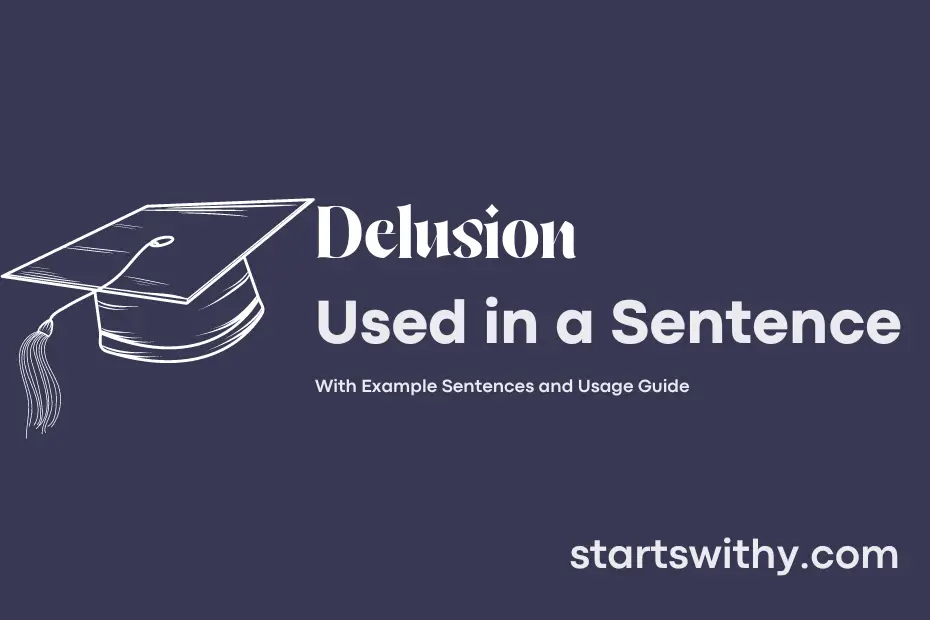Have you ever found yourself believing something that is not based in reality? This phenomenon, known as a delusion, refers to a fixed false belief that is resistant to reason or contrary evidence.
Delusions can manifest in various forms, such as thoughts of grandeur, paranoia, or persecution. Individuals experiencing delusions may genuinely believe in these false ideas, leading to significant distress and impairment in daily functioning.
7 Examples Of Delusion Used In a Sentence For Kids
- Delusion is thinking something is true when it is not.
- It’s important to always check if something is real or just a delusion.
- Sometimes our minds can play tricks on us and make us believe in a delusion.
- We should talk to our friends or family if we think we are experiencing a delusion.
- It’s okay to feel confused when faced with a delusion, but remember to seek help.
- Learning to distinguish between reality and delusion is important for our well-being.
- Let’s remember that a delusion is like a silly prank our mind plays on us.
14 Sentences with Delusion Examples
- Delusion about finishing assignments at the last minute often leads to stress and poor grades.
- Some students have the delusion that they can perform well in exams without proper preparation.
- It’s a common delusion among college students that they can survive on caffeine and junk food during exams.
- Falling for the delusion that attendance doesn’t matter can result in disciplinary actions by the college.
- The delusion that all-nighters are effective study methods is widespread among college students.
- Having the delusion that only studying the night before exams will yield good results is risky.
- It’s important to dispel the delusion that mental health issues don’t affect college students.
- Falling into the delusion of comparing oneself to others can lead to feelings of inadequacy.
- The delusion that success in college is solely based on intelligence often overlooks the importance of hard work.
- Believing the delusion that one can handle heavy course loads without proper time management is a mistake.
- Committing to extracurricular activities while under the delusion that it won’t affect one’s academics is unrealistic.
- The delusion that skipping classes won’t have consequences can result in a lack of understanding of important course material.
- Engaging in unhealthy behaviors due to the delusion of invincibility in college can have long-term consequences.
- The delusion that taking shortcuts in academic integrity won’t be noticed can damage one’s reputation in college.
How To Use Delusion in Sentences?
Delusion means having a false belief or opinion that is maintained despite being clearly contradicted by evidence. When using delusion in a sentence, it is important to accurately convey this meaning.
Here is an example sentence incorporating delusion:
– Despite all the evidence against her theory, she clung to her delusion that aliens were sending her secret messages.
When constructing a sentence with delusion, it is crucial to provide context so that the reader understands the irrational or false nature of the belief being described. This helps to effectively communicate the idea of a delusion.
Remember, delusion is a noun and can be used in various contexts to describe beliefs or ideas that are not based on reality. It is often associated with mental health conditions, but can also be used in a more general sense to describe any false belief held by an individual.
As with any new word, it is helpful to practice using delusion in different sentences to become more comfortable with its meaning and usage. By mastering the use of delusion, you can enhance your vocabulary and effectively communicate complex ideas related to false beliefs and misconceptions.
Conclusion
In conclusion, delusion refers to a belief or perception that is strongly held despite contradictory evidence. It is characterized by a distorted interpretation of reality, often leading to irrational thoughts and behaviors. The examples of sentences with delusion provided in this article illustrate how individuals may experience a range of delusions, from believing in impossible scenarios to experiencing paranoia or grandiosity.
Understanding delusions is important in various fields, including psychology, psychiatry, and even literature, as they shed light on the complexity of human cognition and perception. By recognizing and addressing delusions, individuals can receive appropriate support and treatment to navigate their distorted beliefs and improve their overall well-being.



